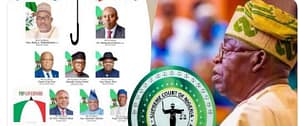
President Bola Ahmed Tinubu has approached the Supreme Court, seeking the dismissal of a suit instituted by eleven governors elected on the platform of the Peoples Democratic Party (PDP), challenging his declaration of a state of emergency in Rivers State.
The governors had, in the suit, faulted the March 18, 2025 emergency declaration, which led to the suspension of Governor Siminalayi Fubara, his deputy, Dr Ngozi Odu, and all members of the Rivers State House of Assembly for a period of six months.
Why Tinubu Declared Emergency Rule
According to the president, the decision to invoke emergency powers was informed by rising political instability and growing security threats within the state. Among the reasons cited were several incidents of pipeline vandalism, including a major fire outbreak on the Trans Niger Pipeline.
President Tinubu accused the Rivers State Government of failing to take necessary steps to arrest the deteriorating situation, which he said posed serious threats to national security and economic stability, especially in the Niger Delta region. He insisted that the federal government had to intervene to prevent a total breakdown of law and order.
PDP Governors Tackle Tinubu
But the PDP governors, in their suit before the apex court, argued that President Tinubu exceeded his constitutional powers. They maintained that the 1999 Constitution (as amended) does not give the president the authority to suspend democratically elected state officials, even during an emergency.
The governors further questioned the process through which the National Assembly approved the emergency rule, claiming that due process and constitutional provisions were not adhered to.
Federal Government Defends Action
However, in its defence, the federal government submitted that President Tinubu acted strictly within the provisions of Section 305 of the Constitution, which empowers the president to declare a state of emergency in any part of the country under specific circumstances.
The government insisted that the prevailing crisis in Rivers State had led to a collapse of governance and posed serious security risks, thus justifying the president’s action. It also maintained that the appointment of a sole administrator to oversee the affairs of the state was necessary to stabilise the situation.
The Supreme Court is yet to fix a date for hearing on the matter.

